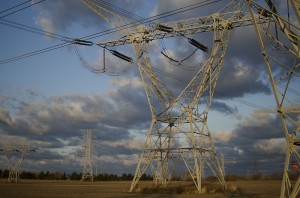Vulnerability of electric grid spurs upgrades and warnings
-
Laura Legere
Utility officials on two sides of the state spent Tuesday discussing ways to modernize and secure the nation’s electric grid.
The Pittsburgh Tribune-Review covered FirstEnergy Corp.’s plans to spend $2.8 billion to upgrade four of its Ohio and Pennsylvania utilities with “smart grid” technology – sensors and controls on power lines and transmission stations that can communicate information about the system remotely and help stem problems before they cascade.
The expanded investment announced Tuesday will replace decades-old equipment and help the company connect [its] large-scale transmission system with its local distribution system, officials said. The equipment it’s replacing is on average more than 40 years old.
Using smart technology will help limit outages and waste, [company spokesman Mark] Durbin said. The sensors it plans to use will help it pinpoint obstructions in the system, steer power around it to limit the impact of outages and quickly mobilize repair crews. It’ll use sensors at transmission stations to get maintenance alerts instead of relying on having workers do potentially unnecessary precautionary checks, Durbin said.
The announcement, the newspaper notes, comes “a decade after failures by FirstEnergy Corp. led to a historic blackout across eight states.” The 2003 blackout helped expose weaknesses in the nation’s aging, interconnected electric transmission system that allowed a local problem – an outage near Cleveland – to build into a power failure that affected tens of millions of people.
In Philadelphia on Tuesday, officials discussed more malevolent threats to the grid: cyberattacks and physical assaults on the system by hackers and terrorists.
According to the Philadelphia Inquirer, former Pennsylvania governor and U.S. Homeland Security Secretary Tom Ridge warned an audience of regional utility officials to better prepare for and address vulnerability in the grid.
He said policymakers need to educate the public that security comes at a price, but the risk of a grid disaster is more costly.
“You want to be pre-emptive or reactive?” he said. “You want better security on the grid, you’ve got to pay. The consumer’s got to pay for it.”

















